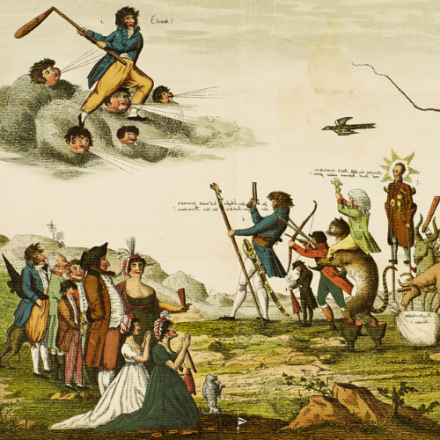Scandal CULTURE Reloaded
Exploring Literary Affairs VIRTUALLY

Project Management: Dr Claudia Bamberg (Universität Trier - Trier Center for Digital Humanities (TCDH)) · Dr Thomas Burch (Universität Trier - Trier Center for Digital Humanities (TCDH)) · Universität Trier - Trier Center for Digital Humanities (TCDH) · Dr. Cornelia Ilbrig (Akademie der Wissenschaften zu Göttingen - Hamburger Arbeitsstelle des Goethe-Wörterbuchs) · Akademie der Wissenschaften zu Göttingen - Hamburger Arbeitsstelle des Goethe-Wörterbuchs · Stefanie Konzelmann (Freies Deutsches Hochstift – Frankfurter Goethe-Museum) · Freies Deutsches Hochstift – Frankfurter Goethe-Museum
Sponsors: Aventis Foundation
Running time: since
Contact person (TCDH): Dr Claudia Bamberg; Dr Thomas Burch
References:
Cornelia Ilbrig: Die Geburt der Frühromantik aus dem Geiste des Skandals. In: Internationales Jahrbuch der Bettina-von-Arnim-Gesellschaft 30/31 (2021) (im Druck)
Research Area: Software Systems and Research Infrastructure, Digital Literary and Cultural Studies, Digital Edition and Lexicography
Keywords: Text Collections, Exhibition Concept, Research and Teaching, Scientific Support for young Researchers (graduate and scholarship programs), 18th century, 19th century
Website of the Project: skandalkultur.freies-deutsches-hochstift.de
The digital platform “Scandal-KULTUR reloaded” makes scandals a central theme of communication in modern times. If museums want to take up current developments, a new approach is necessary, especially in order to reach users of the new media. The emerging platform is interactive and participatory: film scenes, controllable graphic representations and visualizations enable independent and entertaining exploration of the scandal topic. In doing so, new possibilities for dealing with literature are to be initiated and tested, and innovative ways of presentation are to be developed in order to break up the strict division into producer and recipient.
The focus of the multimodal presentation is on five literary scandals from the time between the revolutions of 1789 and 1848, the topics of which are still current today: Goethe's epistolary novel "The Sorrows of Young Werther" deals with 'forbidden' love, suicide and the danger to young people (1774) and the contemporary reactions. Friedrich Schlegel's romantic novel “Lucinde” (1799) and the romantic magazine “Athenaeum” (1798–1800) sparked a scandal about questions of sexuality and gender as well as new, provocative possibilities of expression in art. In the scandal surrounding Karl Sessa's farce “Our traffic” (1812/1815), anti-Semitic attacks up to the pogrom-like so-called “Hepp-Hepp riots” (1819) can be traced. The affair of Heinrich Heine's Judaism and Count August von Platen's homosexuality (1826–1830) lends itself to the analysis of rhetorical strategies to exclude minorities. After all, it is about a religious scandal: Karl Gutzkow's novel “Wally the Doubtler” (1835) was seen as a violent attack on morality and religion - the author even had to go to prison.
The users should discover the scandals and their structures on the platform playfully, among other through a synchronous, interactive scandal timeline with actors, events and documents which are relevant to the scandals (e.g. literary texts, court files, drawings), an interactive city map with scandal hotspots and through computer graphics for analysis of the central elements of the scandals (rhetorical structures, oppositions, public reactions). Short films, which are developed by students in Frankfurt in collaboration with the filmmaker Thomas Claus, create a connection between the historical scandals and the present.
Team TCDH
Dr Claudia Bamberg
E-mail: bamberg uni-trier [dot] de
uni-trier [dot] de
Phone: +49 651 201-3790
Dr Thomas Burch
E-mail: burch uni-trier [dot] de
uni-trier [dot] de
Phone: +49 651 201-3364
Franziska Trauth
E-mail: s2frtrau uni-trier [dot] de
uni-trier [dot] de
Phone: +49 651 201-3365
Michael Lambertz
E-mail: lambertz uni-trier [dot] de
uni-trier [dot] de
Phone: +49 651 201-3226
Radoslav Petkov
E-mail: petkov uni-trier [dot] de
uni-trier [dot] de
Phone: +49 651 201-3359











